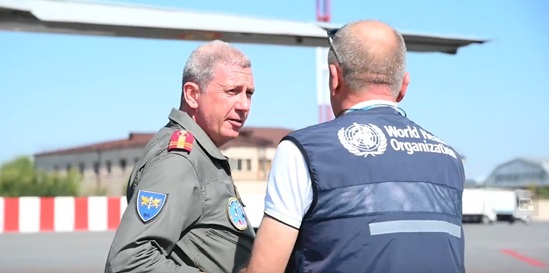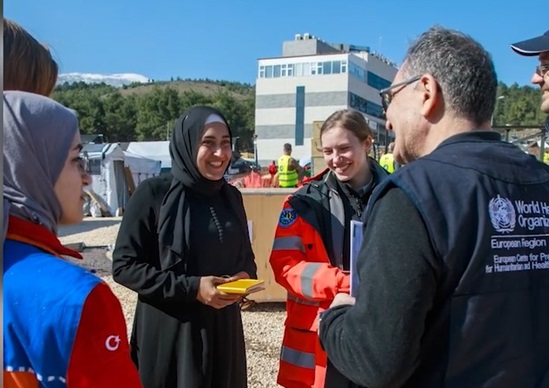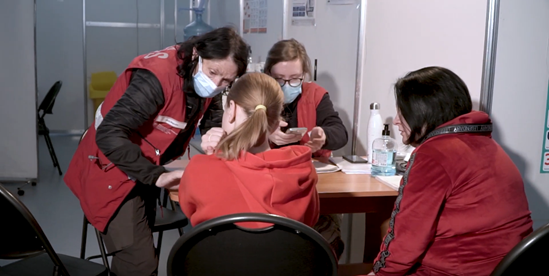The Emergency Medical Teams initiative in the WHO European Region
About the EMTs
Emergency Medical Teams (EMTs) are groups of health professionals, including doctors, nurses and paramedics, that are deployed to provide immediate medical care in emergencies. These teams play a critical role in responding to natural disasters, disease outbreaks, armed conflicts and other crises by delivering essential health services, supporting local health systems and saving lives.
In the WHO European Region, EMTs are integral to the broader health emergency workforce. They are trained and prepared to respond rapidly to crises, providing specialized care that ranges from trauma surgery to public health interventions.
Over the last several years, EMTs have ensured that affected populations received the medical care they needed during the COVID-19 pandemic, the earthquake in Türkiye, the war in Ukraine, the refugee crisis in Armenia and other emergencies.
The EMT Initiative in Europe
The global, WHO-led EMT Initiative is a wide and diverse network encompassing EMTs, national and international organizations, academic institutions, stakeholders, and partners from across the humanitarian and global health emergency sectors.
WHO/Europe has embraced the global EMT Initiative, adapting it to the unique needs and challenges of the Region. Notably, half of the globally classified EMTs are based in the European Region. This reflects Member States’ strong commitment to emergency preparedness and their capacity to contribute significantly to the global health emergency workforce.
Since its inception in 2010, the global EMT Initiative has made strategic shifts. It has expanded from an initial focus on internationally deployed EMTs to the building of national and subnational EMTs, and to surge planning and coordination to strengthen both the resilience and the sustainability of national health systems and workforces.
There is a demonstrated demand for further regionalization of the EMT Initiative, and many activities to support this are already underway in the Region.
The EMT Regional Action Plan 2030
The global EMT 2030 Strategy envisions a world in which every country has the capacity to respond rapidly, effectively and flexibly to national emergencies. In alignment with these strategic goals, the EMT Regional Action Plan 2030 was developed to contribute to stronger health systems and health security in the Region through the integration of EMT response and coordination capacities in national health structures.
EMT Initiative governance in the WHO European Region
WHO/Europe is working closely with health ministries and other relevant authorities to ensure coordination on EMT activities at the highest level. Of the 53 Member States in the Region, 52 have officially nominated national EMT focal points to represent and work directly with the EMT global and regional secretariats; to advocate for a whole-of-government approach to developing in-country EMT capacities; and to coordinate with individual teams in respective Member States.
Moreover, representatives of the EMTs run by governments and nongovernmental organizations participate in the EMT Regional Group (European RG), a community of practice of over 100 professionals. Under the European EMT Governance Structure 2.0, the regular meetings of the European RG serve as the key platform for collective EMT decision-making in the Region.
The Regional EMT Steering Committee, which oversees the European RG, is on a mission to drive forward the regional and subregional growth of the EMT Initiative, and to steer the implementation and regionalization of the global EMT 2030 Strategy.
The Regional European EMT Capabilities Hub (REECH)
REECH supports countries in the Region to strengthen their health emergency response capacity by:
- promoting research on EMTs
- transferring knowledge
- fostering an enabling environment at regional, subregional and national levels.
REECH is hosted by the WHO European Centre for Preparedness for Humanitarian and Health Emergencies in Istanbul, Turkey. This geographical location provides easier connections with the majority of the WHO Health Emergencies priority countries in the Balkans, the southern Caucasus and central Asia. It also allows REECH to benefit from the leadership of WHO/Europe and facilitates the development of partnerships across the Region.
Ultimately, REECH will lead the implementation of the EMT Regional Action Plan 2030, serving as a consolidated source of comprehensive support to Member States and the EMT community of practice. It will aim at improving the quality of EMT preparedness and response activities, delivering trainings and providing mentorship for national EMTs, digitalizing its work, and more.
The Knowledge and Information Management Emergency Platform (KIMEP)
The KIMEP project was launched to enhance key elements of the information management cycle across critical areas of EMT work, including governance, quality assurance, operational research and coordination.
It aims to implement a comprehensive data and information management solution that ensures timely, accurate and accessible data for informed decision-making, research and operational efficiency. Currently, the project focuses on supporting the Governance and Quality Assurance areas of the EMT Initiative within the Region.
The target audience for KIMEP includes team focal points, national focal points, mentors, the EMT Secretariat at WHO, donors, and other interested stakeholders. The modern web application complies with WHO data protection and cybersecurity standards, providing robust role-based access to up-to-date information and analytics.
Spotlight on Emergency Medical Teams
Publications
Emergency Medical Team response to the Türkiye earthquake: lessons learned workshop, 15–16 June 2023
The “Emergency Medical Team (EMT) response to the Türkiye earthquake: lessons learned workshop” was held in Istanbul, Türkiye...
Regional European Emergency Medical Team Capabilities Hub: concept note and strategy
Regional European Emergency Medical Team Capabilities Hub (REECH) will be established in the WHO European Centre for Preparedness for Humanitarian...
Multimedia
News
Related teams
Related content













--first-medical-aid-for-ukrainian-refugees-accommodated-in-the-republic-of-moldova-thumbnail.tmb-549v.png?sfvrsn=51df3c10_1)